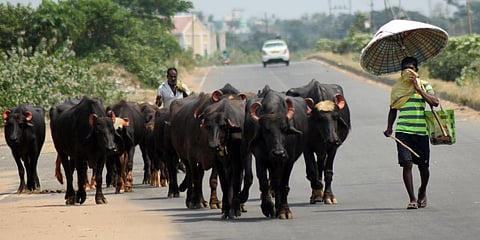

BENGALURU: A study of seven dairy units in Bengaluru has thrown up a grim picture, prompting the researchers to approach the State Pollution Control Board, Bruhat Bengaluru Mahanagara Palike and Animal Welfare Board, among other authorities.
Aarti Bhavana, one of the three researchers of the Ahimsa Fellowship that conducted the study in Bengaluru, told TNIE said the shelters were checked against parameters set for dairies -- like ventilation, presence of dense dung around the shed, legal compliance such as registration by the dairy owner, whether licence has been obtained, and if the dairy has special watertight, non-corrodible containers to store dairy products intended for human consumption.
However, gross violations of all these norms were observed in all the dairies, said Aarti, who is also a lawyer. She said these inadequacies were indicative of the overall state of dairies in the city. The study found that in most dairies, the animals were kept confined in close proximity to each other which did not even give them enough space to sit. The ropes used to tie the animals were so short that they were unable to maintain a natural posture. In some cases, these short ropes did not permit the animals to even move their heads to swat away flies. Many cows had enlarged and abnormal udders, indicating mastitis, in apparent violation of Section 11(1)(b) of the Prevention of Cruelty to Animals Act, 1960.
Mastitis is caused by excessive milking due to artificial insemination, which keeps them continuously pregnant and lactating, a condition that is profitable for the dairy but takes a toll on their bodies. Every dairy the team visited had animals who were in pain due to starvation, thirst, overcrowding and other ill-treatment. Aarti said sick animals were not housed separately.
In violation of Rules 7 and 8 of the Bio-Medical Waste Management Rules, 2016, and Section 288 of the Bruhat Bengaluru Mahanagara Palike Act, 2020, the researchers found that bottles and vials — both used and full — were discarded along with syringes in heaps of garbage inside and outside the premises.
Milking was done in an unhygienic manner, with milk being collected in old paint buckets placed on surfaces covered with dung and urine, Aarti added. It’s a clear violation of the Food Safety and Standards Act, 2006. In some dairies, the cows’ food was found to be infested with flies, or contained plastic. This eventually translates to milk having microplastic content, she said. Similar studies were held by various researchers in Delhi, Maharashtra, Chhattisgarh and Odisha.
Shelters visited
BBMP Cattle Shed, Fraser Town
Sri Thimmaiah Milk Centre, Nagarbhavi Circle
Magadi Road 8th A Cross
Marathahalli, Ashwathnagar
Under Domlur flyover
Gayathri Nagar
Subramanya Nagar